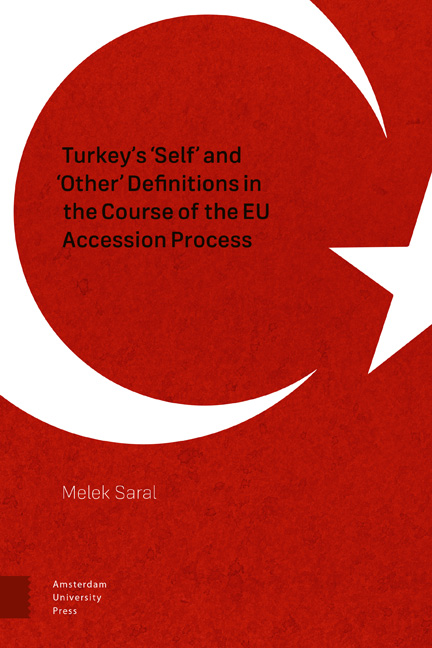Book contents
- Frontmatter
- Contents
- Acknowledgements
- Abbreviations
- 1 Socialization or Estrangement within the Framework of Turkey-EU Relations
- 2 The Concept of Socialization and Identity Change
- 3 New Phase in Turkey-EU Relations: Opening the Door to Europeanness
- 4 The Helsinki Summit: The Recognition of (Muslim) Turkey’s Europeanness
- 5 Start of Negotiations, End of Negotiations
- 6 New Area, New Identity, New Roles: Turkey – European or Middle Eastern?
- 7 Results and Implications
- Bibliography
- Index
6 - New Area, New Identity, New Roles: Turkey – European or Middle Eastern?
Published online by Cambridge University Press: 12 February 2021
- Frontmatter
- Contents
- Acknowledgements
- Abbreviations
- 1 Socialization or Estrangement within the Framework of Turkey-EU Relations
- 2 The Concept of Socialization and Identity Change
- 3 New Phase in Turkey-EU Relations: Opening the Door to Europeanness
- 4 The Helsinki Summit: The Recognition of (Muslim) Turkey’s Europeanness
- 5 Start of Negotiations, End of Negotiations
- 6 New Area, New Identity, New Roles: Turkey – European or Middle Eastern?
- 7 Results and Implications
- Bibliography
- Index
Summary
After 2005, many Turks saw Turkey's membership as a dream going nowhere. The relatively pro-Turkey leaders in France and Germany were replaced by skeptics. The discussion in Europe prior to the December 2004 Brussels Summit about a privileged partnership was also widely reported in the Turkish media and injured Turkish pride. The pressure for the recognition of Cyprus was seen as unjust since the Turkish Cypriots had voted in favor of the Annan Plan for resolution of the deadlock. Also the return of PKK terrorism strengthened the belief that the EU and the USA were behind the Kurdish separatists. During this time, the opposition parties fueled nationalism and supported the conspiracy theories. In the middle of this atmosphere, the EU lost its attraction and the government searched for other potential relationships. Some saw the Eastward shift in foreign policy as a pragmatic avoidance of the excessive concessions required by the EU and the USA. The changing international and regional dynamics, Turkey's economic interests in the region, and its ambitions for a role as an energy corridor were also regarded as significant reasons for the transformation of Turkey's foreign policy. Others considered this shift a result of the ideological and emotional motivations of the AKP. Many scholars pointed to the new foreign minister, Ahmet Davutoğlu, as the person behind the new foreign policy parameters. His book, Strategic Depth, proposed that in the near future, Turkey must develop alternative policies toward its neighboring regions so it would have enough room to maneuver (Göksel 2009: 33-37).
In the course of pursuing internal stability, ongoing economic development, political development, and the decades-long modernization/ Westernization process in line with liberal, democratic, and secular values, Turkey has developed new roles which became an essential element in reflecting and defining its new identity within the boundaries of state and in relation to others outside these boundaries (Göl 2013: 36; Oğuzlu 2016: 59). Starting from the mid-2000s, Turkey engaged in a more active foreign policy based on its multidimensional identity and extensive historical and cultural links with the region (Davutoğlu 2001). This foreign policy no longer consisted simply of the pro-Western interventionism followed from the 1950s through the 1990s; Turkey now sought to act as a pivotal country in the Middle East and the surrounding region as a close ally of the West.
- Type
- Chapter
- Information
- Publisher: Amsterdam University PressPrint publication year: 2017



